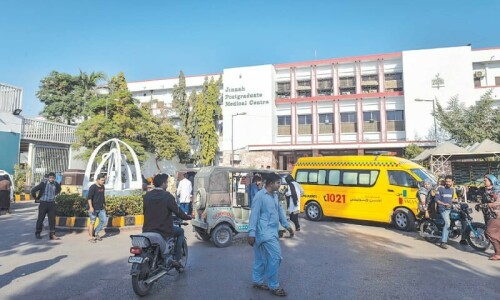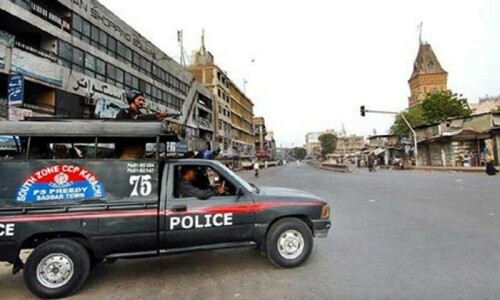KARACHI: Speakers at a seminar on gender issues on Thursday urged the government and society at large to effectively implement the laws made against gender discrimination and ensure that female members of society receive same the prestige and treatment that was given to its male members.
“Today’s mindset is that women are like servants or even less, which is very unfortunate,” said retired Justice Majida Rizvi, chairperson of the provincial human rights commission while presiding over a seminar on the ‘Role of youth in the diminution of gender-based injustice’ organised by the Foundation for Research and Human Development (FRHD), a non-governmental rights body and several other organisations at the Sindh Scouts Auditorium.
She said fundamental rights enshrined in the Constitution promised equal treatment to everyone but unfortunately there was no implementation of those laws.
“Gender equality is guaranteed under the Constitution. We have got all the good laws, but at the same time we see no implementation of them.”
The former justice said poverty was one key factor that contributed hugely to prevalent inequality in society.
She called upon the youth, who formed majority of the audience at the seminar, to change “male-dominant mindset” and do not discriminate against their female siblings.
She asked teachers that they should not differentiate between boys and girls.
According to the data presented at the seminar, 60 per cent of the world population living below the poverty line comprised of women and girls.
In Pakistan, according to Global Gender Gap Report 2014 (GGGR-2014), 9pc women as compared to 5.4pc men are unemployed and 25pc as compared to 86pc share labour force participation. Women have 70pc less income than men on average, and they are far fewer in numbers (3pc as compared to 97pc) as legislators, senior officials and managers.
Above 60pc of the illiterate adult population in the world are women. In Pakistan, according to the GGGR-2014, 42pc (as compared to 67pc) women are literate, 67pc (as compared to 77pc) are enrolled in primary education, 31pc (as compared to 41pc) in secondary education, while 9pc (as compared to 10pc) in tertiary education.
Imam-ud-Din Shoqeen, a former provincial minister, said not just women faced discrimination in society, but every weak segment was vulnerable and had been victimised.
He said Islam had given rights to women equivalent to men, but keeping distance from the religion was the basis of injustices.
“Lack of education is also a key factor which widens discrimination in society,” he said. “Women in Karachi may be facing poverty, but women in the rest of Sindh are living a life worse than animals.”
Shahjahan Baloch, provincial director of ActionAid NGO, said Pakistan was a signatory to the Convention of Elimination of Discrimination Against Women — and it was necessary to eliminate such discrimination.
He said youth could change the mindset of society and they should use social media to raise voice against discrimination.
Retired Justice Zafar Sherwani said there was no lack of laws against gender and social discrimination, yet it was continuously on the rise for lack of implementation.
“From 1938 to 2013 laws exist to tackle all problems, but they are seldom implemented,” he said.
Karamat Ali, director of the Pakistan Institute of Labour Education and Research, said people hoped to live in a democratic society but there were barriers within the society itself.
“There is inequality in resource distribution, but human discrimination is the major issue,” he said. “In our society, there is major discrimination between male and female.”
He said arguments were often given to support such discrimination, but all those acts were inhuman in which women and girls were the most vulnerable.
Iqbal Detho of the Save the Children said injustices and discrimination were not the issues of the modern era, since they were persistent in old societies as well.
He gave references from history and said that injustices against women was widespread.
Nazra Jahan, executive director of the FRHD, gave a general introduction of the organisation, its programme besides introducing the participants.
Published in Dawn, February 27th, 2015
On a mobile phone? Get the Dawn Mobile App: Apple Store | Google Play













































Dear visitor, the comments section is undergoing an overhaul and will return soon.